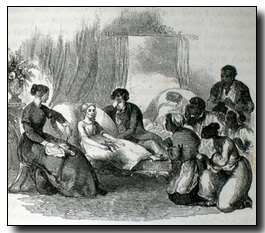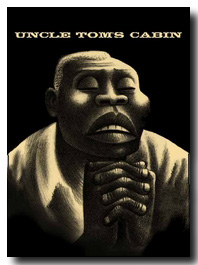Uncle Tom's Victory
- PHILLIP E. JOHNSON
Today, hardly anybody reads "Uncle Toms Cabin", probably because the book has picked up a reputation as a cliché-ridden anti-slavery potboiler rather than as the moving story of faith and courage it truly is. Another reason for the neglect of "Uncle Toms Cabin" is that it is written with a profoundly Christian sensibility.
 |
On a recent auto trip, my wife and I passed the freeway miles listening to a recording of Uncle Toms Cabin. In the 1850s, this sensational bestseller lit the fuse of the explosion of moral passion that made the American Civil War inevitable, and so touched the conscience of England that the British government could not pursue its commercial interests by helping the South to break the ruinous naval blockade. Today, hardly anybody reads Uncle Toms Cabin, probably because the book has picked up a reputation as a cliché-ridden anti-slavery potboiler rather than as the moving story of faith and courage it truly is.
Another reason for the neglect of Uncle Toms Cabin is that it is written with a profoundly Christian sensibility that modern people have been taught to deride. This factor alone would prevent the book from being read or even honestly described in our supposedly multicultural school systems, where the textbooks no longer even acknowledge that Dr. Martin Luther King, Jr., was a "Reverend." Harriet Beecher Stowe, the author of Uncle Toms Cabin, went so far as to insist at times that, "I did not write that book." She meant that the words came to her in bursts of inspiration directly from the Holy Spirit, and I think that you have to be capable of believing that to appreciate fully the miracle that this little woman of limited experience somehow put on paper.
Anybody could have described the horrors of slavery, or explained that the oppressed slaves were human beings like all the rest of us, not the sub-humans with only brutish feelings that the slaveholders had to believe them to be. Mrs. Stowes art was that she made the slaves and those who helped or oppressed them come alive in the imagination of people who knew nothing of slavery. Her readers could feel the desperation of slave mothers whose children were torn from them to be sold "down river" to lives of cruel misery, and they also felt the tragedy of whites who tried to be kind and to do justice in a society whose legal system was built upon slavery, which was cruelty and injustice legalized. She brought alive the simple virtues of brave people who struggled just to read a few words, but who understood the message of the Bible better than all the learned clergymen of the world, perhaps because they were able to come to it as little children, as Jesus said we all must.
Under the influence of Marxist logic, which is still influential in Europe and America despite the disasters of Marxism in practice, Uncle Toms name and faith became symbolic of shuffling acquiescence to racial degradation. This noble character is in truth the incarnation in antebellum America of the Suffering Servant of Isaiah 53, the archetype of the Christ, who overcomes the world by the patient endurance of what cannot be avoided, and whose triumph on the cross will always look like defeat to those who do not believe or understand the Bible.
The slave system was designed to brutalize, to make the slaves as brutish as their masters needed them to be. Even the best-intentioned masters only helped the evil system to survive longer by diluting its poison with their thin goodness. Their remembered kindnesses sometimes contributed to the misery of slaves who would find themselves sold after a kind masters death or bankruptcy to a sadistic tyrant like Simon Legree.
Uncle Toms victory was that even the greatest cruelty and misfortune could not degrade him to the point where he lost his faith in Christ or became willing to save himself from evil by doing evil to others. When Legree orders Tom to either beat another slave and become an informer or be beaten to death himself, Tom calmly endures torture and death rather than do anything he knows to be wrong. When Tom dies at last, we readers can almost hear the shouts of welcome from that cloud of witnesses who were alongside him from the start.
 |
It is superficial to read Uncle Toms Cabin as if it were only an overwhelmingly powerful attack upon the racial slave system of its day. It was that, of course, but one can be a slave in many ways, some of which may even disguise themselves as liberation. Uncle Toms Cabin is really an exposure of sin, which encompasses every form of cruelty and exploitation, and especially the all too common self-deception that leads an individual to enslave himself to evil habits in the deluded belief that he is thereby exercising his own free will. Tom knew that he was a victor at the moment of his death, but he might not have felt so victorious if he had known what would happen to his people after emancipation, in a nation that debates not whether to end slavery or segregation, but whether to curtail racial preferences for blacks in law school admissions.
I came home from that auto trip to read a New York Times story titled, "Prison Rates Among Blacks Reach a Peak, Report Finds." It seems that on any given day, 12 percent of black men aged 20 to 34 are in jail or prison. The corresponding rate for white men is 1.6 percent. Over their lifetime, 28 percent of black men will spend time in prison.
The imprisonment rate for blacks is disproportionately high, but the number of prisoners of all races is also four times what it was before the mid-1970s, when prison sentences started to skyrocket. I have called the 1960s the period of Americas Declaration of Independence from God. The godless times began with the triumphalist Darwinian centennial in 1959, and the courts soon converted the constitutional commitment to religious freedom into a commitment to enforced secularization of public life and education. The sexual revolution of the 1960s was a logical consequence, as was the abortion revolution of the 1970s, when moral relativism was shoe-horned into the Constitution in what Supreme Court Justice Byron White rightly called an exercise of "raw judicial power." The fruit of relativism and God-despising is not liberty, but addiction, murder, and imprisonment.
Amazingly, black Americans kept their Christian faith and their devotion to family life intact despite the cruel separation of family members in slave auctions, and through the horrors of lynchings and segregation that came afterwards. A spiritual strength that resisted oppression heroically was eventually worn down by the poisonous influence of a culture that taught black and white citizens to despise God and to exalt "choice" as the only moral standard. One hundred and ten years after emancipation, and about ten years after that Second Declaration of Independence, imprisonment for crime rather than slavery had become the great destroyer of black families. Americans of all races hardly even knew what they had lost. How could they know? Unlike the barely literate Tom, they were no longer educated in the things that matter most.
 This is J. Fraser Field, Founder of CERC. I hope you appreciated this piece. We curate these articles especially for believers like you.
This is J. Fraser Field, Founder of CERC. I hope you appreciated this piece. We curate these articles especially for believers like you.
Please show your appreciation by making a $3 donation. CERC is entirely reader supported.

Acknowledgement
Phillip E. Johnson. "Uncle Tom's Victory." Touchstone (July/August, 2003).
This article reprinted with permission from Touchstone: A Journal of Mere Christianity.
Touchstone is a Christian journal, conservative in doctrine and eclectic in content, with editors and readers from each of the three great divisions of Christendom Protestant, Catholic, and Orthodox. The mission of the journal and its publisher, the Fellowship of St. James, is to provide a place where Christians of various backgrounds can speak with one another on the basis of shared belief and the fundamental doctrines of the faith as revealed in Holy Scripture and summarized in the ancient creeds of the Church.
The Author
Phillip E. Johnson, J.D. (University of Chicago), is Professor of Law (emeritus) at the University of California at Berkeley, where he taught for 30 years. A frequent lecturer, he is also the author The Right Questions: Truth, Meaning & Public Debate, Darwin on Trial, Reason in the Balance, Defeating Darwinism by Opening Minds, and The Wedge of Truth (all InterVarsity), as well as of two textbooks on criminal law. Dr. Johnson is an elder in the Presbyterian Church (U.S.A.), and he now has a regular column in Touchstone, "The Leading Edge."
Copyright © 2003 Touchstone

